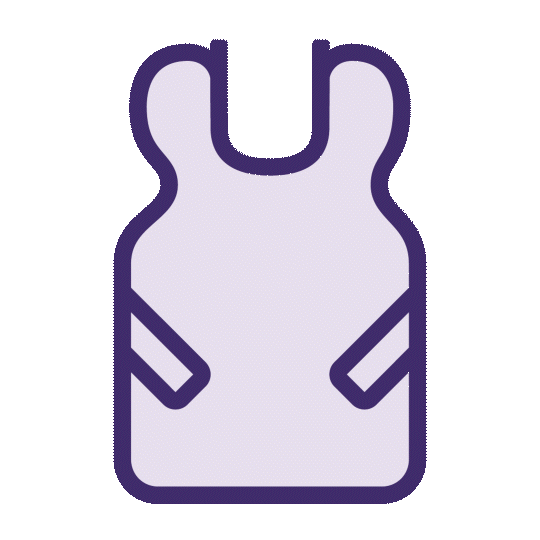Professional Lead Apron Cleaning and Disinfection Services for Hospitals
Surface wipes can’t eliminate the embedded pathogens and biofilm lurking in lead aprons—84% of hospital lead aprons tested positive for ringworm and Staph aureus. Only RCS offers a clinical-grade deep cleaning process that meets CDC, AORN, and Joint Commission standards to truly disinfect your protective gear.

Trusted by 500+ Teams
Proven Multi-Step Disinfection
Every garment that enters our facility undergoes a comprehensive cleaning process designed to eliminate surface contamination and embedded pathogens. Because you cannot disinfect a dirty surface, we first clean the garment before applying professional-grade disinfection agents that are bactericidal, viricidal, fungicidal, and sporicidal.
Our Process Includes:
- Two step cleaning and disinfection process
- Exterior repairs completed
- Deep friction cleaning
- ATP test cleaning verification
When Your Garments Return:
Your aprons return thoroughly disinfected and ready for immediate safe use. Each garment is documented in RadComply with complete service records. You’ll also receive detailed reports showing which garments were repaired and your garment’s annual X-ray inspection results.


Schedule Your Garment Deep Cleaning Service
Tell us about your facility’s garment inventory and cleaning needs. Our specialists will show you how our two-step process eliminates bacteria, viruses, fungi, and spores that surface wipes leave behind — meeting AORN, Joint Commission, and CDC standards every time.
Drop Us Note
Why Professional Lead Apron Cleaning Matters
A contaminated lead apron isn’t protection. It’s a risk.
Research from Wayne State University found that 84% of lead aprons in hospitals tested positive for Staphylococcus aureus and ringworm, with 12% testing positive for MRSA. These pathogens don’t just sit on the surface. They form protective biofilm structures that shield bacteria from standard wipe-based practices. Every day, dozens of healthcare workers across multiple departments wear these shared garments, creating continuous exposure risks that surface wipes alone cannot address.
The Problem with Surface-Only Cleaning:
- Biofilm protects pathogens
- Fluids seep into fabric
- Disinfection requires two steps

How The Process Works
After garments have been collected through our RadOnsite or RadShip services, they enter our comprehensive multi-step process that ensures both radiation safety and pathogen elimination. Each piece is professionally inspected, serviced, and fully documented in RadComply. Our deep cleaning and disinfection protocols go beyond surface-level cleaning to eliminate embedded pathogens and extend the life of every garment. This is the only proven method to completely eliminate embedded pathogens.
Following best practice standards set by:
- AORN
- The Joint Commission
- CDC

X-Ray Inspection
Every garment is scanned to detect cracks, tears, or lead deterioration that compromise radiation protection.

Repairs and Inventory
We mend exterior damage, replace worn components, and document each garment in RadComply with complete service history.

Deep Cleaning and Disinfection
Garments are cleaned with specialized cleaning agents that remove embedded dirt, sweat, debris, and bacteria that surface wipes cannot reach.
ATP Testing Verification
After cleaning, garments are ATP tested to verify bioburden removal before the disinfection stage.
Statistics That Matter:
13 Minutes
Average staff time saved per garment with RCS service.
30-50% Longer
Extended garment lifespan with professional maintenance versus wipes only.
$300-800
Cost per replacement apron that proper care helps avoid.
100% Audit-Ready
Complete compliance documentation archived in RadComply for Joint Commission surveys.
Professional Service protects your team, extends equipment life, and reduces liability exposure.
Proper garment maintenance is more than a safety protocol. It’s a strategic investment that protects your hospital from healthcare-acquired infections, premature equipment replacement, and compliance violations that could surface during Joint Commission surveys. Regular professional cleaning demonstrates your commitment to staff safety while maximizing the return on expensive capital investments.
- AORN
- The Joint Commission
- CDC
How To Get Started
Starting with RCS is simple. We assess your facility’s needs, design a service plan to match, and handle every detail. Your garments stay compliant, and your team stays focused.
Schedule Your Consultation
Connect with our team to discuss your current garment inventory, department needs, and compliance requirements.
Choose Your Service Model
Select RadOnsite for convenient on-site pickup and delivery, or RadShip for a streamlined shipping-based solution with loaner garments included.
Experience Seamless Service
RCS handles your lead garment program from end to end, while you access real-time inventory, compliance data, and X-ray scan results in RadComply.
Ready To Say Goodbye To Filthy Lead?
Lead Garment Cleaning & Care: What Every Hospital Needs to Know
Clean Those Leads
Hospital-owned lead garments require professional deep cleaning, not just surface wipes. RCS follows a proven two-step cleaning and disinfection process that meets AORN, The Joint Commission, and CDC standards to eliminate bacteria, viruses, fungi, and spores.
Save Time
RCS customers save an average of 13 minutes per garment by eliminating the need for staff to perform manual X-ray scans, track inventory spreadsheets, and manage repair schedules. Our service frees your radiology techs and clinical staff to focus on patient care instead of garment management.
84% Of Lead Vest Are Contaminated
A Wayne State University study found that 84% of lead aprons tested positive for Ringworm and Staphylococcus aureus, with 12% colonized by MRSA. Contaminated protective equipment puts both healthcare workers and patients at risk of infection.
Wipes Aren’t Enough
Surface wipes alone are clinically proven ineffective for properly sanitizing lead garments. True sanitization requires a two-step process: friction-based cleaning followed by proper sanitization using bactericidal, viricidal, fungicidal, and sporicidal solutions.








